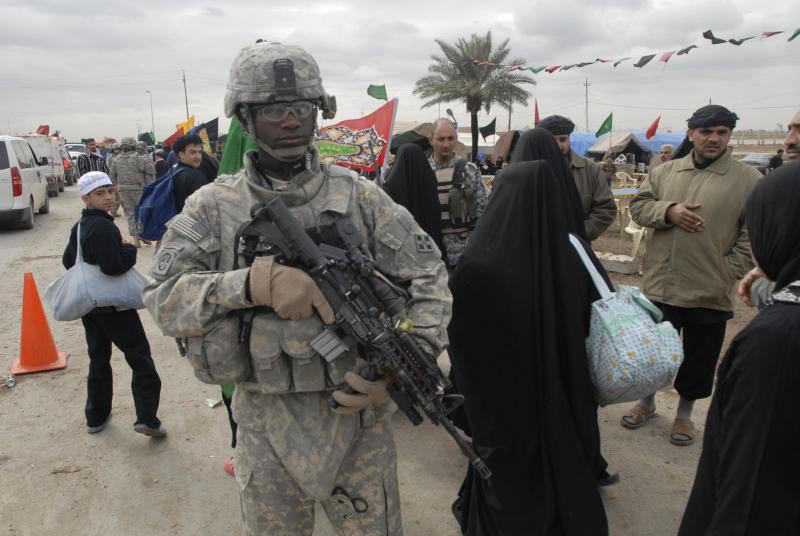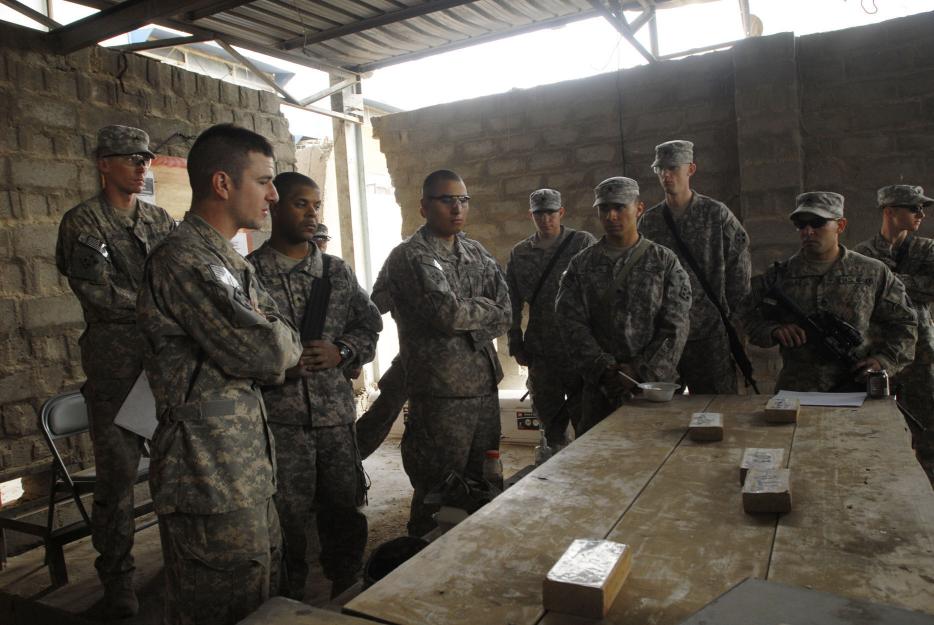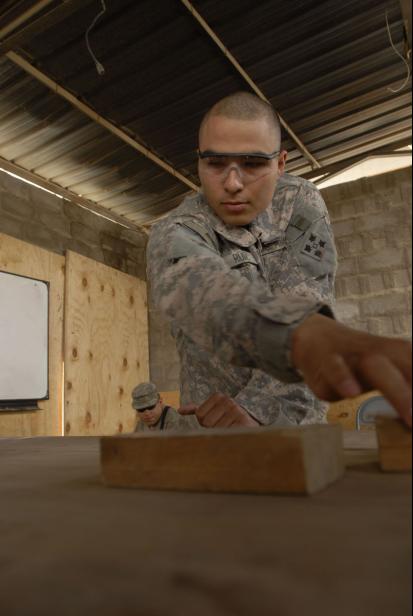![]() 1st Battalion 22nd Infantry
1st Battalion 22nd Infantry ![]()
E Company Clears the Way
February 13, 2009
‘Raider’ Engineer Company clears the way
Sgt. 1st Class Brent Williams
1st BCT PAO, 4th Inf. Div., MND-B
FORWARD OPERATING BASE FALCON,
Iraq — Most Soldiers try to avoid improvised explosive
devices.
Combat engineers of Company E, attached to the 1st Special Troops
Battalion, 1st Brigade Combat Team,
4th Infantry Division, Multi-National Division—Baghdad,
actively hunt for roadside bombs;
in fact they cheer when they find an IED.
As Iraqi Shiites began the
massive processions to Karbala in commemoration of the day on
which Imam Husayn,
the 3rd Shiite Imam was killed in Karbala in the year 680 AD,
MND-B engineers conducted route clearing missions
that play a critical role in assisting Iraqi Security Forces
providing security for marchers.
“We are the only ones who do this mission,” said Sgt.
Jose Gandara, a combat engineer,
with 1st Bn., 22nd Infantry Regt., 1st BCT, 4th Inf. Div., has
cleared more than 12,000 kilometers of highway,
street and road, since arriving in Baghdad last April. “We
know that if there was a good job done,
we know that we did it.”
Various elements of the engineer
company spent the first six months of their deployment operating
from
a joint security station in the Rashid district, conducting daily
security operations in support of the ISF mission
to provide security for the citizens of Baghdad, said Gandara.
The other half of the company operated from
Forward Operating Base Falcon, training the 1st National Police
Mechanized Brigade to conduct the route clearance
and sanitation missions. Gandara, of Kansas City, Mo., said that
he takes pride in the fact that his crew
works very hard to avoid damaging the curbs and sidewalks, as
they move the heavy armor vehicles
to clear the roads around southern Baghdad — a very slow,
deliberate process.
“We have made the routes cleaner, conducting route
sanitation every couple weeks to clean up the streets,
picking debris; searching for IEDs to make the battle space more
advantageous to friendly forces.”
The number of roadside bombs dropped drastically this year, added
Gandara, who said that in 2006
his company cleared almost 200 IEDs in less than six months.
“This year, company-wise, we have cleared
not even 20 bombs,” he said.

FORWARD OPERATING BASE
FALCON, Iraq — Sgt. 1st Class Thomas Sutton, a combat
engineer platoon sergeant
provides security for Iraqi citizens walking southern Baghdad's
Airport Road en route to Karbala Feb. 11. Millions of Shiite
Muslims
conduct the annual pilgrimage to the city in observance of the
Islamic holiday, Arba'een. Sutton, from Goldsboro, N.C.,
assigned to Company E, 1st Battalion, 22nd Infantry Regiment,
assists Iraqi Security Forces providing security
for the religious observance that was once forbidden by the
Saddam regime.
(U.S. Army photo by Sgt. 1st Class Brent Williams, 1st BCT PAO, 4th Inf. Div., MND-B)
The improved security situation
is a direct result of the progress made by the ISF, and the
combined missions
between the combat engineers and their Iraqi counterparts,
explained Sgt. 1st Class Thomas Sutton,
an engineer platoon sergeant, 1st Bn., 22nd Inf. Regt., 1st BCT,
4th Inf. Div.
“They’re working to the point where they consistently
lead the patrols and we put them out front,
put them in the lead.” Sutton said the engineers did an
excellent job training the ISF on their equipment;
and continue to mentor the Iraqis during route clearance
missions; establishing a good rapport with the ISF
and the Iraqi people. “They have taken all the [procedures]
that we have established and are putting them to good use,”
said Sutton, originally from Goldsboro, N.C.
The work makes for long hours
and hard work, said Sgt. Joshua Ruck, a combat engineer from
Madison, Ohio. The Soldiers may put in long hours maintaining and
cleaning the vehicles, and conducting tactical approach training
and operations with the ISF, but their combined efforts have
yielded results.
“We have already achieved our objectives compared to where
we were the last time we were here,” he said.
The engineers led the ISF from
the first day, providing training and equipment for their Iraqi
counterparts
to establish their first route clearance team, said 1st Sgt.
Sammy Sparger, the company’s senior
non commissioned officer. “They’re doing their own
things and they’re doing it well.
They’ve gone from a nonfunctioning unit without training and
equipment to having their own vehicles
with their own patrols; setting their own schedules and
conducting their own maintenance.”
The units now operate on a day-to-day basis to provide mobility
and freedom of movement for the combined forces
and to ensure that Iraqi civilians remain safe, said Sparger.
The engineering mission is
tough, admitted Sparger; “like being an offensive lineman in
football.”
“Route clearance is a boring and redundant mission that
takes disciplined Soldiers to execute.”
The Soldiers of Co. E performed superbly throughout the
deployment and especially during recent months,
conducting consecutive back-to-back missions to ensure that
Iraq’s Provincial Elections were a success, said Sparger.
More recent, the combined forces stepped up patrols, to protect
Iraqi Shiites making their way to Karbala
from possible attacks. These accomplishments are in large part
due to a special group of combat support Soldiers,
a collection of mechanics and logistics specialists from the 4th
Support Bn. and 1st Special Troops Bn.,
who are serving as combat engineers to help the route clearance
mission. “The 4th Support Bn. Soldiers
have done awesome,” said Sparger. “They are eager and
ready to learn, and have done a good job.”
|
FORWARD
OPERATING BASE FALCON, Iraq — Velez, of
Bayamon, Puerto Rico, (U.S. Army photo by Sgt.
1st Class Brent Williams, |
Staff Sgt. Yamil Velez, an
automated logistics noncommissioned officer with 4th Support Bn.,
thought he would never be an engineer. The mission for the
Soldiers is more than just patrols in sector,
explained Velez, from Bayamon, Puerto Rico, who for maintains the
“Buffalo”, a heavy armor,
counter-IED vehicle. Working with combat engineers since
November, Velez said he believes
the most important part of his job is showing the Iraqi people
that the Soldiers care,
and that the combined forces are willing to go the “extra
mile” to keep the bombs and the bad guys off the streets.
“Everything in “Echo” [Company] is based on
redundancy, and that is how we make money;
doing the same thing every day, that is how we learn the mission
and that is how we get proficient with it,”
he said. “I mean as NCOs that is what we do; train and train
and train and train. We take it very seriously.”

FORWARD OPERATING BASE
FALCON, Iraq — 1st Lt. Casey Staker (left foreground), a
platoon leader assigned to
Company E, 1st Battalion, 22nd Infantry Regiment, leads his
Soldiers on a patrol brief Feb. 11, in the Rashid district
of southern Baghdad before a mission in support of Multi-National
Division—Baghdad. The combat engineers are responsible
for maintaining the 1st Brigade, 4th Infantry Division’s
route clearance mission and assisting Iraqi Security Forces
ensure that roads are free of improvised explosive devices and
unexploded ordnance.
(U.S. Army photo by Sgt. 1st Class Brent Williams, 1st BCT PAO, 4th Inf. Div., MND-B)

FORWARD OPERATING BASE
FALCON, Iraq — Pfc. Ricardo Ruiz, a transportation
specialist from Chicago,
assigned to Company E, 1st Battalion, 22nd Infantry Regiment,
illustrates battle drills during a patrol brief for his platoon
before a route clearing mission Feb. 11, in the Rashid district
of southern Baghdad. The Multi-National Division—Baghdad
combat engineers of Company E worked with Iraqi Security Forces
to provide security for the Islamic religious holiday,
Arba'een, when millions of Shiite Muslims journey hundreds of
miles to the Iraqi city of Karbala..
(U.S. Army photo by Sgt. 1st Class Brent Williams, 1st BCT PAO, 4th Inf. Div., MND-B)
Home | Photos | Battles & History | Current |
Rosters & Reports | Medal of Honor | Killed
in Action |
Personnel Locator | Commanders | Station
List | Campaigns |
Honors | Insignia & Memorabilia | 4-42
Artillery | Taps |
What's New | Editorial | Links |